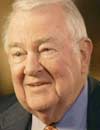Have you been a source for reporters?
Oh, I'm sure. Oh, absolutely. I've never been a source of leaking information that shouldn't be disclosed.
And never revealed anything that wasn't public?
I've revealed things that weren't public, but nothing that should not have been revealed. ... In other words, I almost never gave information to one reporter that I wouldn't give to a whole bunch of reporters or wouldn't have answered a question in a news conference. As a matter of fact, I was somewhat, I won't say notorious, but certainly consistently thought of when I was in the White House as someone who didn't leak. ...
How often were you a source in the Nixon administration for reporters?
From time to time.
Few leaks?
Yeah. I didn't have too much to leak except I worked on some confidential sources.
You were protected by reporters.
Sure.
Was this whistleblowing, or was this spinning?
Oh, I spun a lot.
Right. So you were getting protection not for the public good, but for your political good.
No, because they liked me, and I was one of them. And also I have a feeling that there was too much classification going on.
You, William Safire, decided, sitting in the White House, decided on your own there was too much classification going on and I'm going to declassify documents? A speechwriter?
Let me tell you what happened once. I got a bunch of information from [Henry] Kissinger's office about Vietnam speeches I was writing. So I write the speech, and I put on the top of it: "I'm sending into Haldeman to give to the president. Secret. Eyes only. No dis," meaning no distribution.
Someone put that on there.
No, I did. I typed it across the top of the page. ... I sent it in, and I waited for the president to send the speech back, and it didn't come. I called Haldeman, and I said, "Where did [he put] the draft?" You know, the president would make notes on it, and I'll rewrite it. And he said, "I would send it back to you, but you're not cleared for top secret, no not for distribution." So I had classified my own stuff and I'm not cleared for it.
There's an element of ridiculousness in this overclassification business. I'm aware of the fact that stamping something secret is easy to do and unstamping it is very hard to do.
So you decided to leak some of it? I mean, you said earlier that you had been a source for some reporters in some cases involving classified information that you, William Safire, decided on your own to declassify.
No, I didn't declassify secret information; I spun. I said, "Now, this is what's been published, but this is what it means." Now, is that leaking? It's spinning. I didn't say, "This many troops went into this place." That would be leaking, but when you're inside, you should be expressing the point of view of the administration that's trying to affect public opinion.
But what I'm getting at is that you expected confidentiality from the reporter you were spinning, and he theoretically, or she, would have to be willing to go to jail if there had been an investigation of some kind. You expected that you were going to be protected. But the content --
No, no, no, no, no. You're operating on the thesis that I was giving information of a secret, and I wasn't.
OK, but you did expect protection.
When I would say, "This is not for attribution," that means you can't quote me at all or indicate a White House speechwriter. I didn't do that all too often, frankly.
No, but the reporter who you were talking to, you expect them to basically protect you.
Of course, or otherwise I'll talk to somebody else, or else I wouldn't talk at all. That's the whole idea of confidentiality. If the reporter has the weapon of being able to say, "Tell me the story and I won't get you involved," that's a powerful way of getting information out into the public. Now, you sometimes will burn a source if he has deliberately misled you. Then all bets are off.
![News War [site home page]](../art/p_title.gif)









